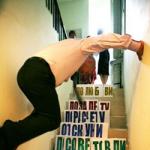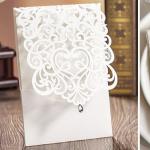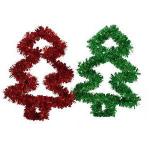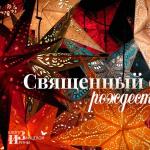A nursery rhyme about a grandmother with a bucket and a hare. Techniques for learning to create nursery rhymes and fables
We do lessons with my youngest daughter in the evenings in the kitchen when I come home from work. My daughter Sanya is a scraper, when she was born, the older children were already finishing school. And everyone was immensely happy about her birth, and nursed together from the first days of her life. And now, when the older guys have all become independent and scattered somewhere, Sanya and I are left alone, and I have to go through the school path with her from the very beginning. The first class was given to us with difficulty, there were more experiences and failures than joys and pride from successes. Sasha went to the second grade already confidently, there was a desire to study, school friends finally appeared. The child is ready for school.
Of all the school subjects, Sasha loves reading the most. Moreover, it is difficult for her to read large texts on her own, we always read them together, but poems, nursery rhymes, tongue twisters cause her a lot of joy and emotions.
After work, I most of all want to switch off for at least half an hour, but when I open the door, it immediately becomes clear that this is impossible. Our kitten is the first to meet me, he flies out jumping sideways from around the corner, jumps on me, and immediately rushes to the bowl with screams. Behind him, my dear Sanechka jumps skipping. The ponytail is on one side, the elastic has gone astray in a day, and she still does not know how to tie her hair on her own. In the hands of a textbook on reading, and rushes along with him to hug me.
After feeding the kitten, we both sit down to dinner ourselves. Sasha chatters, talking about all his daily adventures, school successes, homework. The reading topic they are currently studying is oral folk art or folklore. This word is not given to Sasha in any way, and I don’t understand why second-graders need it. The topic itself is very good, here are riddles, here are epics about Ilya Muromets. I tell my daughter that Ilya Muromets actually existed, that he really was a man of great strength, that there is a lot of fiction and fairy tales about him in epics, but he really was a defender and hero, therefore he was preserved in the memory of the people. That Ilya Muromets rests in the Kiev-Pechersk Lavra, where he died as a hermit, and where he was canonized as a saint.
My daughter is silent for a while, digesting dinner and the information received from me.
- Mom, and today we were given such an interesting task! I just can't do it without you. We have a funny picture in the textbook, we need to come up with a nursery rhyme for it, but my rhymes ran away.
- Have you eaten? Do you want to eat more? Let's clear the table then, and we'll compose a nursery rhyme ...
- Mom, cheers, you caught the rhyme!
- It happened by chance, when on assignment - then the rhymes really scatter, daughter.
We clear the table, take a textbook and notebook, and start thinking.
In the picture, to which you need to come up with a nursery rhyme, it is not clear what is drawn. Granny, girl, hare, chicken and mouse run in different directions, scattering buckets of water and apples. Here you go, come up with something worthwhile ...
We think it's time. We twist this way and that, we both laugh to tears. The result is a masterpiece:
Grandma ran with buckets,
slipped and fell.
Grandma scared her granddaughter
And she lost the bucket.
And the animals ran, they also lost their buckets.
Hare clap - an apple in the forehead!
Chicken seam - cluck-tah-tah!
Mouse break - she has a bruise!
We especially laugh at the poor mouse, and we go to bed laughing. At night, the daughter smiles in her sleep. She dreams of a mouse with a bruise on her pope, and a grandmother with buckets. And maybe also Ilya Muromets, about whom I have been talking so much since the evening. Such a joy when you can do homework together, drink tea and laugh. And then watch your child smile in a dream. Simple moments of real happiness.
Your baby is not yet able to speak, looks at you and at the world with surprised eyes, as if he wants to understand something, to ask about something. And you really want to tell him as soon as possible about a life full of miracles, about the meaning of words and objects, about how much you love him and will always, always be there until he becomes big and strong ... How can you start talking to your tiny child like that? so that he understands you and smiles happily in response? For this, affectionate rhymes-sentences have long been invented among the people, the so-called nursery rhymes designed to help parents communicate with the baby in a way that is accessible to him.
Nursery rhymes for newborns
Many will ask: “Why read nursery rhymes to a newly born baby? After all, he is still small to understand something ... ”However, it is not in vain that nursery rhymes for newborns have existed for many centuries and are still popular to this day. After all, the baby reacts positively to the gentle calm voice of his mother, he stops crying and listens carefully when he is told a nursery rhyme. Over time, children get used to the fact that all the daily processes of caring for them are accompanied by funny rhymes, they begin to rejoice and smile as soon as they hear familiar words. Moreover, as a rule, nursery rhymes for the smallest are accompanied by a pleasant gentle stroking of the arms, tummy, legs and back of the child, as well as a kind of speech exercise. At the same time, a small person establishes contact with his mother, learns to understand human speech, gets acquainted with his body and the surrounding reality.
Oh, swing, swing, swing,
In the heads of something kalachi,
Gingerbread in the hands
Apples in the legs
Candies on the side
Golden branches.
(Alternately touch the head, arms, legs.)
wide river,
High coast.
(On the first line, hands to the sides, on the second line, stretch your hands up.)
little chin,
Cheeks, cheeks,
Nose, lips.
And behind the lips - the tongue
He is used to being friends with the pacifier.
Eyes, eyes,
Eyebrows, eyebrows,
Lobik, lobik-clever -
Mom doesn't like it.
(Sentence, showing where the eyes, nose, etc.
On the last line, you can kiss your miracle.)
Here we woke up, stretched,
Turned from side to side!
Snacks! Snacks!
Where are the toys, rattles?
You, toy, rattle, raise our baby!
We woke up, we woke up.
(Handles to the sides, then cross on the chest).
- Sweet, sweet stretched.
(pull handles up)
Mom and dad smiled.
Rhymes for children up to a year
A growing baby is more and more interested in everything that surrounds him. All this time he is open to communication. Funny nursery rhymes for children under one year old will bring a lot of pleasure to both participants in the "dialogue" if they are simple, short and tell about things that are interesting and understandable to the baby. By the middle of the first year of life, children are quite familiar with their body parts. They understand where they have a nose, where they have eyes, where are their arms, legs, fingers ... Nursery rhymes for kids, such as the well-known "Ladushki" and others, help them learn and consolidate this knowledge in a playful way.
Shadow-shadow-sweat,
Above the city is a wattle fence.
The animals sat on the wattle fence.
Boasted all day.
The fox boasted:
- I am beautiful to the whole world!
Bunny boasted:
- Go, catch up!
Hedgehogs boasted:
- We have good coats!
The bear boasted:
- I can sing songs!
Cockerel, cockerel,
golden scallop,
butter head,
silk beard,
That you get up early
Eat loudly
Do you let the kids sleep?
Like our cat
The coat is very good
Like a cat mustache
amazing beauty,
bold eyes,
The teeth are white.
Owl Owl
Owl Owl,
Big head,
Sitting on a stump
turns his head,
Looking in all directions
Yes ka-a-ak
Will fly!
(Raise the child's hands up.)
Here they are in the bed
pink heels.
Whose heels are these -
Soft and sweet?
Goslings will come running
Pinched at the heels.
Hide quickly, don't yawn
Cover with a blanket!
Where are our ears?
Listen to the pests!
Where are the eyes?
Watching fairy tales!
Where are the teeth?
Hiding lips!
Well, keep your mouth shut!
almonds, almonds,
Where were you?
- By Grandma.
- What did you eat?
- Kasha.
- What did you drink?
- Brazhka.
Butter bowl,
Brazhka sweetie,
good grandmother,
Drank, ate
Home, fly! (We wave our arms, and then put them on our heads)
Sat on the head!
The paws sang.
Fun for all occasions
From the depths of centuries, nursery rhymes for children who came up with caring mothers and babysitters for use in a variety of situations. It is good to pronounce them regularly when the child wakes up, washes, eats.
Water, water,
Wash my face
To make the eyes sparkle
To make cheeks blush
To laugh mouth,
To bite a tooth.
Hey, alright, alright
We are not afraid of water
We wash clean
We smile at mom.
Cheeks?
Washed.
Spout?
Washed?
And the eyes?
Forgot.
Here we spread our hands
As if they were surprised.
And each other to the ground
They bowed to the belt!
Bent over, straighten up
Bent over, straightened up.
Down, down, don't be lazy
Bow and smile.
(Exercise with the child. Starting position
- Feet shoulder width apart. Recite the poem, performing the movements.)
Pinocchio stretched,
Once - bent over
Two - bent over
Three - bent over.
Raised hands to the side,
Apparently the key has not been found.
To get us the key
You need to get on your toes.
(Together with the child, recite a poem,
performing all the movements in the text.)
(Alternately bend fingers)
This finger is a grandfather
This finger is a grandmother,
This finger is daddy
This finger is mommy
This finger is me
That's my whole family.
This finger went to the forest,
This finger found a mushroom
This finger has taken its place
This finger will lie tightly,
This finger - ate a lot,
That's why he got pissed off.
Spider, spider,
Anya grab the barrel.
Frog, frog,
Anya grab by the ear.
Deer, deer,
Grab Anya by the knees.
Doggie, doggie
Anya grab the nose.
Hippo, hippo,
Anya grab the stomach.
wasp, wasp,
Anya grab by the hair.
Grasshoppers, grasshoppers,
Grab Anya by the shoulders.
(substitute your child's name)
Who will be here kup-kup,
By water - squelch-slurp?
In the bath quickly - jump, jump,
In the bath with a leg - jerk, jerk!
The soap will foam
And the dirt is going somewhere.
Ah, koklya-moklya,
The eyes got wet.
Who will hurt the baby
That goat will gore.
Don't cry, don't cry
I will buy a roll.
Don't whine, don't whine
I will buy another.
Wipe your tears
I'll give you three.
The pussy hurts
The dog hurts
And my baby
Live-live-live.
Rails, rails (we draw one, then another line along the spine)
Sleepers, sleepers (we draw transverse lines)
A belated train was driving (we “ride” with a palm on the back)
From the last window
Peas suddenly fell down (we knock on the back with the fingers of both hands)
Chickens came, pecked (knocking with index fingers)
Geese came, pinched (we pinch the back)
The fox came, (stroking the back)
I waved my tail
An elephant passed, (“we go” along the back with the back of our fists)
The elephant has passed, ("we go" with our fists, but with less effort)
A little baby elephant passed. ("Let's go" with three fingers folded into a pinch)
The store manager came, ("we go" on the back with two fingers)
He smoothed everything, cleared everything. (stroke the back with palms up and down)
I put a table, (depict - a table with a fist)
Chair, (chair - pinch)
Typewriter. (typewriter - finger)
I began to print: (we “print” on the back with our fingers)
Wife and daughter
Jin-dot. (On these words, every time we tickle the barrel)
I send you stockings
Jing dot.
I read, (we move our finger, as if we are reading)
Crumpled, smoothed, (pinching, and then stroking the back)
I read
Wrinkled, smoothed out
folded,
Sent. ("Put the letter" behind the collar) Calls for dinner.
The ducks have eaten
The cats have eaten
The mice ate.
Are you not yet?
Where is your spoon?
Eat a little!
magpie-crow
cooked porridge,
Jumped on the threshold
Called guests.
The guests were not
Didn't eat porridge
All my porridge
magpie-crow
I gave it to the kids. (we bend our fingers)
gave it
gave it
gave it
gave it
But she didn't give it:
Why didn't you cut wood?
Why didn't you carry water?
Donut, flatbread
Sitting in the oven
looked at us,
I wanted it in my mouth.
When and how to use nursery rhymes?
Also, nursery rhymes are used:
- when the child is dressed for a walk;
- bathe;
- help to wake up in a good mood;
- if the child is naughty or naughty;
- to play with him;
- for teaching the baby in a playful way, etc.
In addition to the above positive aspects of using nursery rhymes in raising young children, they contribute to the formation of a sense of humor, rhythm, and creative abilities. On this page we present to you a collection of nursery rhymes that we have lovingly assembled. We will be glad if they help you and your baby to understand each other better. Communicate with pleasure!
Previously, nursery rhymes and pestles were an integral part of raising a child. They were passed down from generation to generation, and it was a wonderful way to communicate with an infant. Today, we use these funny folklore rhymes less and less often and are not even aware of the colossal benefits that they bring.
First of all, nursery rhymes and pestles are a way of establishing contact with the baby and pleasant emotions. During the pestle, you can do a light massage to the child, stroke the arms and legs. When a mother pronounces a rhythmic pestle or nursery rhyme, she does it expressively, affectionately, stretching out vowel sounds. Babies like this kind of speech, they understand it, and thus the foundations are laid for the development of speech from the first months of a baby's life. And for this you do not need to do anything special - just have a good time with the baby, accompanying some of your actions with nursery rhymes or pestles.
With the help of nursery rhymes and pestles, you can play with your child and introduce him to the world around him through simple and easy communication. They are also indispensable when it is necessary to distract or calm the child, accustom to the daily routine: wash, dress, comb, go to bed. Native speech is mastered with nursery rhymes, develops fine motor skills, a sense of rhythm and getting better emotional connection between mother and baby.
All these are good reasons not to forget to pamper and entertain the baby with funny nursery rhymes, jokes and pestles.
In the morning when the baby woke up
We woke up,
We woke up.
Sweet, sweet stretched.
Mom and dad smiled.
Here we woke up, stretched,
Turned from side to side!
Snacks! Snacks!
Where are the toys, rattles?
You, toy, rattle, raise our baby!
Podushushki:
In the hands - grips,
In legs - walkers,
In the mouth - talker,
And in the head - the mind!
Who, who lives in this room?
Who, who rises with the sun?
This Mashenka woke up,
Turned from side to side
And throwing back the blanket
Suddenly she stood up on her own!
(A. Barto)
The sun looks out the window
Shines into our room.
We clap our hands -
Very happy with the sun.
cockerel cockerel
golden scallop,
butter head,
Silk beard.
That you get up early
Eat loudly
Do you let Sasha sleep?
For washing
Hey, alright, alright
We are not afraid of water
We wash clean
We smile at mom.
almonds, almonds,
Wash my paws with soap.
clean palms,
Here's some bread and spoons for you.
Water, water,
Wash my face
To make the eyes sparkle
To make cheeks blush
To laugh mouth,
To bite your teeth!
The swan geese flew
They flew into the open field,
They found a bathhouse in the field,
The swan was bathed.
Bunny began to wash.
Apparently he was going to visit.
Washed out the mouth
Washed out the nose
Washed my ear
That's dry!
For combing
You grow, grow, braid,
To silk belt:
How will you grow, spit,
You will be the beauty of the city.
cockerel cockerel,
Comb my comb.
Well please, please
I'll comb my curls.
For dressing
Masha put on a mitten.
“Oh, where am I doing my finger?”
Masha took off her mittens
Look, I found it!
We have one Vanechka,
We won't give it to anyone.
We will sew a coat for him,
Let's send him for a walk.
Our Katya is small,
She is wearing a scarlet fur coat,
beaver edge,
Katya is black-browed.
When we cook food
almonds, almonds,
Let's bake pancakes.
We'll put it on the window.
Let's make it cool down.
And cool down - let's eat
And we'll give it to the sparrows.
pot-sly
We cooked porridge
Covered with a scarf.
And waiting, waiting
Who will come first?
Carcasses, tutushki,
Mama baked vitushki,
Mom baked vitushki
For beloved Ilyushka.
Ay, tu-tu, ah, tu-tu,
Cook the porridge cool
Pour the milk
Feed the Cossack.
In the kalachi oven,
Like fire is hot.
Who are the livers for?
For Mashenka kalachi,
They are hot for Mashenka.
For feeding
Clever, Katenka,
Eat sweet porridge
Delicious, fluffy
Soft, fragrant.
Tasty porridge is smoking,
Sasha sits down to eat porridge
Very good porridge
Eat porridge slowly.
Spoon by spoon
Ate a little.
The cat went to the stove -
Found a pot of porridge.
On the kalachi oven,
Like fire is hot.
Gingerbreads are baked
The cat's paws are not given.
Our Vanyusha fidget,
Doesn't eat lunch.
Sit down, get up, sit down again
And then they ate all the porridge.
Lyuli, lyuli, lyulenki,
The gulls have arrived
The ghouls began to say:
“What should we feed Mashenka with?”
One will say: "Kashkoi",
Another: "Curdled milk",
The third will say: “Milk,
And a ruddy pie.
Donut, flatbread
Sitting in the oven
looked at us,
I wanted it in my mouth.
Come on, come on, come on, come on!
Do not grumble, you pans,
Don't grumble, don't hiss,
Cook sweet porridge.
Cook sweet porridge
Feed our baby.
The cat went to the market,
I bought a cat pie
The cat went to the street
I bought a bun for a cat.
Do you have yourself
Or take down Mashenka?
I'll bite myself
Yes, I'll take Mashenka too.
For the first steps
Baby, little baby
little remote,
Walk the path
Stomp, baby, foot
Big feet
Walked along the road:
TOP, TOP, TOP!
small feet
Run along the path:
Top-top-top-top-top!
Pussy, pussy, pussy, come on!
Don't sit on the path
Our baby will go
It will fall through the pussy.
For consolation
Don't cry, don't cry
I will buy a roll.
Don't whine, don't whine
I will buy another.
Wipe your tears
I'll give you three.
Don't cry, don't cry baby
A squirrel will jump to you
Will bring nuts
For the Fun Machine.
The pussy will come slowly
And pet the baby
Meow-meow - the pussy will say
Our baby is fine.
For laying down to sleep
Little hares
Wanted bainki,
Wanted bainki,
Because bunnies.
We'll sleep a little
We will lie on the back.
We lie on the back
And let's sleep quietly.
The night has come
The darkness brought
The cockerel dozed off
cricket sang,
It's getting late, son
Lie down on the barrel
Bye-bye, sleep...
Already you, kitty-kitty,
Kitten - gray tail!
You come to spend the night with us
Download our Masha,
Download our Masha,
To lull.
How do I like you, cat,
I will pay for the work:
I'll give you a piece of the pie
And a jug of milk.
There is a dream at the cradle -
Bye, bye.
Whose eyes here wanted to sleep -
I know I know.
You are not three with your fists, close it,
Sleep shakes the cradle.
Go to sleep.
(bend fingers)
This finger wants to sleep
This finger went to bed
This finger just took a nap
This finger is already asleep.
This one is fast asleep.
Quiet! Hush, don't make noise!
The red sun will rise
The clear morning will come.
The birds will chirp
Fingers will rise!
(fingers flex)
Was this information useful?
Not really
In this lesson, you will get acquainted with pestles, nursery rhymes and jokes, find out for what purpose they are used, and learn how to read them correctly.
This is a comic quatrain, in which there are funny words. And to find out how people call such rhymes, you need to decipher the following word:
Akshetop
Read it from right to left:
nursery rhyme
nursery rhyme This is a fun folk song. Word nursery rhyme comes from the word make fun(to make fun of; to make fun of someone or something). Rhymes are called folk, because they are created by the people. When children were lulled or cheered so that they would not cry, they were told or sung such nursery rhymes.
Read some of them:
Knocking, strumming down the street:
Thomas rides a chicken
Timoshka on a cat
On a crooked path(Fig. 2) .

Rice. 2. “Knocking, strumming down the street” ()
There was a clock on the wall
Cockroaches ate the arrow
The weights were torn off by the mice,
And the clock did not run.
A cat, cat, cat,
curly pubis,
I stole a ball from my grandmother,
And hid in a corner
Grandma caught up
I fought for a chubochka(Fig. 3) .

Rice. 3. “A cat, cat, cat ...” ()
Read a few verses:
- Fedul, did you pout your lips?
- The caftan burned through.
- Can I sew it up?
- There is no needle.
- How big is the hole?
- One gate left(Fig. 4) .

- I caught a bear!
- So lead here!
- It doesn't work that way.
- So lead yourself!
- Yes, he won't let me!(Fig. 5)

Dog
- Dog, what are you barking?
I scare wolves.
- The dog that tucked its tail?
- I'm afraid of wolves.
Think about how the verses read above differ from nursery rhymes? Both are funny, but the last verses are built in the form of a dialogue (a conversation between two people or animals). These are not jokes, these are jokes.
Among the people, little fairy tales, short funny stories, sometimes in the form of a dialogue, are called jokes .
Rhymes differ from pestles and nursery rhymes in that they are not associated with any game movements. But they have some kind of fairy-tale plot. For instance:
fidget baby,
bright head,
pours, sings,
Just like a nightingale!
It doesn't matter that there is no skill,
Much joy from singing(Fig. 6) .

Get out of the way cat!
Doll Tanechka is coming,
Doll Tanechka is coming,
Nothing will fall!
The Russian people, like any other, has its priceless wealth - folklore. Mothers, grandmothers, nannies composed jokes, songs, pestles for their little children.
Pestushki - these are small poems that were accompanied by movements small child arms, legs.
Word pestle comes from the word nurture- nurse, cherish, nurse.
When the baby wakes up and stretches, they stroke his tummy and say in a singsong voice:
sips,
little ones,
mouth talking,
grasping hands,
The knowledge of the baby about the surrounding objects is formed depending on what they tell him, so the little animals are endowed with human qualities.
Nursery rhymes, jokes, pestles need to be told in a special voice: affectionately, gently, so that the child understands that they are addressed specifically to him, and so that the child understands what it is with these nursery rhymes or pestles that the mother, nanny or grandmother wants to tell the child. Read them slowly, in a singsong voice, gently. For instance:
Dog in the kitchen
Bakes pies.
cat in the corner
Rusks are pushing.
cat in the window
The dress is sewn.
Hen in boots
Hut sweeps(Fig. 8) .

Rice. 8. "The dog is in the kitchen ..." ()
This is how the baby grows.
- pestles - we swing on our hands, we lull;
- nursery rhymes - play with hands and feet;
- jokes - we teach to know the world around us.
Bibliography
- Kubasova O.V. Favorite pages: Textbook on literary reading for grade 2, 2 parts. - Smolensk: "Association XXI century", 2011.
- Kubasova O.V. literary reading: Workbook for a textbook for grade 2, 2 parts. - Smolensk: "Association XXI century", 2011.
- Kubasova O.V. Guidelines to textbooks of 2, 3, 4 classes (with an electronic application). - Smolensk: "Association XXI century", 2011.
- Kubasova O.V. Literary reading: Tests: Grade 2. - Smolensk: "Association XXI century", 2011.
- Detyam-books.ru ().
- Nsportal.ru ().
- Doc4web.ru ().
Homework
- Define pestle.
- Explain the difference between jokes and jokes.
- Learn your favorite joke by heart.





